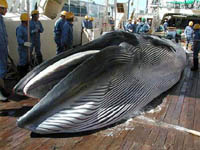Japanese whaling vessels to be chased with new speedy boat
A fast ship that can keep up with Japanese whaling vessels will be deployed next month in an attempt to thwart an annual hunt in the Antarctic, a militant conservation group said Wednesday.

Paul Watson, captain of the Sea Shepherd group's flagship Farley Mowat, said the new boat will soon join his vessel in Antarctic waters for a monthlong campaign to obstruct the Japanese whalers.
Watson, who declined to name or describe the new ship, said it would overcome the whalers' ability to outrun the protesters. "We now have a vessel that can match their speed, so that's what will be different this year."
Japan plans to harpoon up to 935 minke whales and 10 endangered fin whales during the annual hunt.
Watson said he hoped the Farley Mowat, which was used to deliberately sideswipe a whaling vessel during the last hunt, will set out from the southern Australian city of Hobart this weekend.
Watson intends to rendezvous with the new sister ship in the Antarctic Ross Sea, where the Japanese whaling fleet is expected to be operating.
Sea Shepherd has come under criticism from some conservationists, including Greenpeace, for threatening to ram whalers and using tactics that could endanger human life, the AP says.
Japan began conducting what it calls "research whaling" each year after the International Whaling Commission imposed a global ban on commercial whaling in 1986. Japanese officials claim the program - and the use of lethal harpoons - are needed to gauge whale populations, and to study their breeding and feeding habits.
Environmental groups say the hunts are a pretext to keep Japan's tiny whaling industry alive.
Subscribe to Pravda.Ru Telegram channel, Facebook, RSS!





